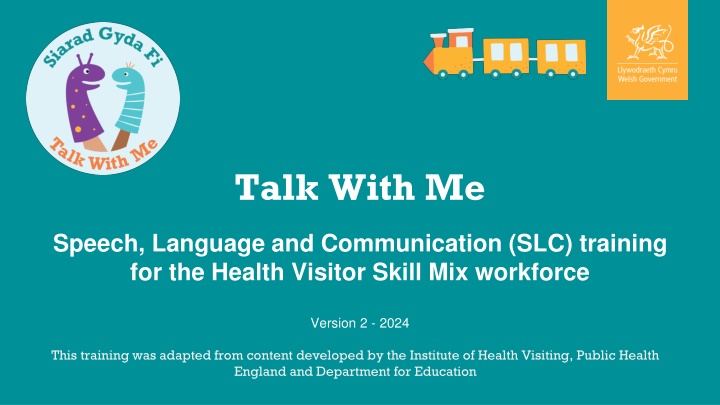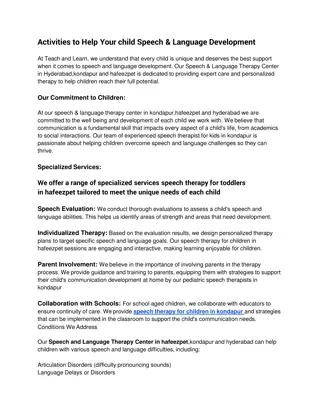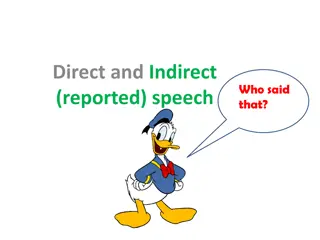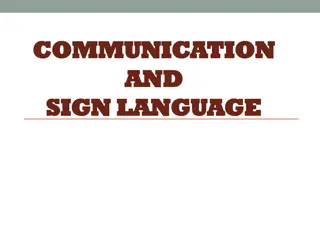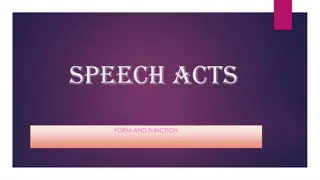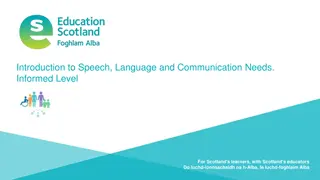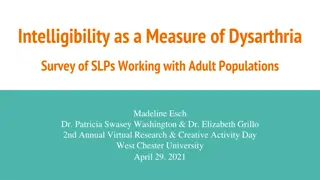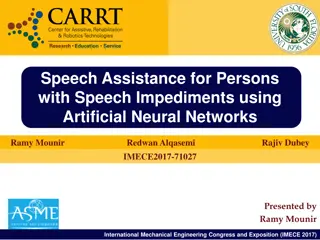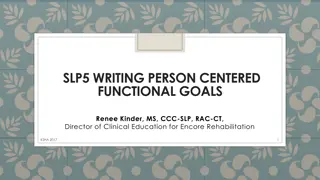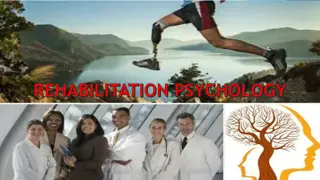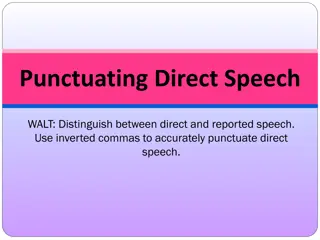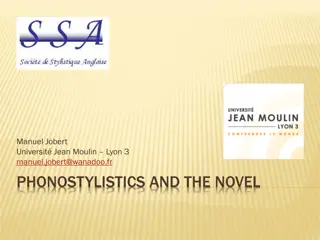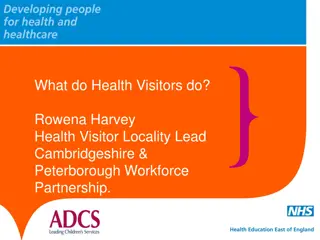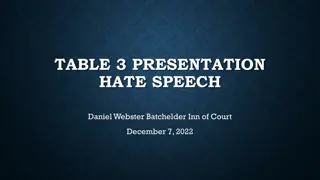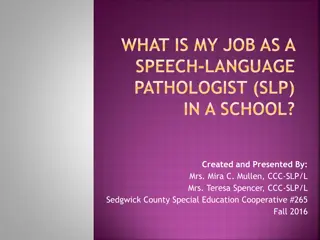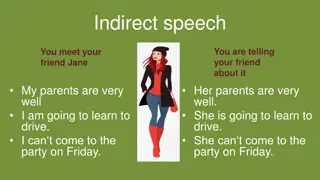Talk With Me Speech, Language, and Communication Training for Health Visitors - Version 2, 2024
Providing essential training on speech, language, and communication skills for Health Visitors and the Skill Mix workforce, this program aims to empower professionals with the tools and knowledge to support families in promoting speech and language development. Adapted from content developed by reputable organizations, the training covers a range of topics from early intervention to specialized services, emphasizing the importance of universal promotion of speech, language, and communication messages. With a virtual delivery approach and a focus on various levels of care, including intensive and targeted support, this comprehensive training equips participants with the necessary skills to enhance child development and family well-being.
Download Presentation

Please find below an Image/Link to download the presentation.
The content on the website is provided AS IS for your information and personal use only. It may not be sold, licensed, or shared on other websites without obtaining consent from the author.If you encounter any issues during the download, it is possible that the publisher has removed the file from their server.
You are allowed to download the files provided on this website for personal or commercial use, subject to the condition that they are used lawfully. All files are the property of their respective owners.
The content on the website is provided AS IS for your information and personal use only. It may not be sold, licensed, or shared on other websites without obtaining consent from the author.
E N D
Presentation Transcript
Talk With Me Speech, Language and Communication (SLC) training for the Health Visitor Skill Mix workforce Version 2 - 2024 This training was adapted from content developed by the Institute of Health Visiting, Public Health England and Department for Education
Timetable Timetable for the day: 10:30am ish 16:30pm ish 12:30pm ish 09:00am Talk with Me Speech, Language and Communication Training
Virtual Delivery **Hide if face to face KEEP YOUR MIC ON MUTE USE THE CHAT BOX TO ASK QUESTIONS. CAMERA ON USE THE HANDS UP FACILITY Talk with Me Speech, Language and Communication Training
Talk With Me Delivery Plan Delivery Plan, Page 24 Talk with Me Speech, Language and Communication Training
Talk With Me Delivery Plan Talk with Me Speech, Language and Communication Training
Healthy Child Wales Programme Welsh Levels of Care Intensive- referral to specialist services, intensive structured home visiting programmes Progressive universal approach to SLC support provide intervention and assess response prior to referral to specialised SLT service Enhanced- child development, speech and language, Parenting support programmes, including assessment and promotion of parent-baby interaction Targeted SLC support from EY workforce provided to families with a child at risk of Speech, Language and Communication Needs (SLCN) Universal- parenting, secure infant attachment and bonding, involvement of fathers. All families could benefit from universal promotion of SLC messages health and development, promotion of sensitive Talk with Me Speech, Language and Communication Training
Healthy Child Wales Programme Assess and promote the development of the child s speech and language skills (HCWP QA framework, 2022) Welsh Levels of Care Talk with Me Speech, Language and Communication Training
Aim of the Training To equip Health Visitors, skill mix teams and partner agencies with additional skills and knowledge to support families in promoting speech, language and communication (SLC) in the home learning environment, to support improved health and wellbeing outcomes. Effective interventions and prevention in the early critical years of a child s life are vital to ensure a best start in life and reduce long term health and social issues (HCWP QA framework, 2022) Talk with Me Speech, Language and Communication Training
Introduce [ ]early language and play development in baby groups and at home (HCWP QA framework, 2022) Learning Outcomes Understand typical Speech, Language and Communication (SLC) development Identify risk and protective factors for speech, language and communication needs (SLCN) through your observations and discussions Consider the impact of SLCN on the child Promote evidence-based strategies to support families to support their children to learn to talk Know when to seek extra support/ signpost appropriately to universal, population, targeted and specialist services as required (NB right person/ place/ time) Talk with Me Speech, Language and Communication Training
Why Health Visiting? The Health Visiting Service Workforce have expertise and opportunities to promote speech, language and communication development with all families The Talk with Me Delivery Plan focuses on SLC as the golden thread over time: consider right person/ place/ time Health visiting teams can offer timely interventions through established relationships with families Health Visiting teams work within the home and can promote this as the most important learning environment Talk with Me Speech, Language and Communication Training
Activity: Identification of SLCN Consider: How do you currently identify SLCN? Which contact points are most crucial for this? How do you ensure that SLC is considered at every contact? What do you listen out for from the parent? From the child? How do you currently decide what to do next? Discuss with parents/carers their views and any concerns they may have regarding their child s speech, language and communication (HCWP QA framework, 2022) Talk with Me Speech, Language and Communication Training
Activity- Barrier Game You will need the following equipment: blank paper, 3 different colours of pen / pencil / crayon. 1. 2. Sit to your partner or place a barrier between you. If online, turn off your cameras. 3. Decide who will be the instructor first. The other person will be the listener . You will be given 5 minutes in each role. 4. The instructor will start to draw a simple image, and describe what she is doing as an instruction as she draws. e.g. draw a large circle in the middle of your page . 5. The listener follows the instructions and without looking at the instructor s picture, draws according to her instructions. 6. Continue to do this until the picture is finished. The listener is not allowed to ask questions and the instructor is not allowed to give clues e.g. with gestures. 7. Compare pictures how similar are they? 8. Swap roles and repeat the process. 9. Discuss how this activity felt. Talk with Me Speech, Language and Communication Training
Why does SLC matter? Talk with Me Speech, Language and Communication Training
Why does SLC matter? Talk with Me Speech, Language and Communication Training
Why does SLC matter? Talk with Me Speech, Language and Communication Training
Policy Context in Wales Talk with Me Speech, Language and Communication Training
Break See you in 15 minutes Talk with Me Speech, Language and Communication Training
SLC is Everyone s Business Work with multi-agency team with a plan of care to deliver intensive support for speech, language and communication needs (HCWP QA framework, 2022, Intensive level) Discuss with parents/carers appropriate stimulation to enable their children to reach their full potential with their social, play and language development, both in and outside the home (HCWP QA framework, 2022) Talk with Me Speech, Language and Communication Training
Importance of the Home Learning Environment The child s communication environment was a more important predictor of language development at two, and school entry baseline scores at 4 than socio- economic background (Roulstone et al., 2011) Talk with Me Speech, Language and Communication Training
Importance of the Home Learning Environment Mon Home Home Nursery Nursery Nursery Nursery Home Tue Home Home Nursery Nursery Nursery Nursery Home Wed Home Home Nursery Nursery Nursery Nursery Home Thurs Home Home Nursery Nursery Nursery Nursery Professional Visit Home Home Home Home Home Home Home Fri Home Home Nursery Nursery Nursery Nursery Home Sat Home Home Home Home Home Home Home Sun Home Home Home Home Home Home Home 07:00 08:00 09:00 10:00 11:00 12:00 13:00 Home Home Home Home Home Home Home Home Home Home Home Home Home Home Home Home Home Home Home Home Home Home Home Home Home Home Home Home Home Home Home Home Home Home Home Home Home Home Home Home Home Home 14:00 15:00 16:00 17:00 18:00 19:00 20:00 Talk with Me Speech, Language and Communication Training
SLC Definitions S - Speech L - Language C - Communication Talk with Me Speech, Language and Communication Training
SLC Speech, language and communication are essential life skills. They are linked with social and emotional development, learning, behaviour, and mental health. SLC is therefore a fundamental indicator of child wellbeing. Language The words and sentences that we understand and use Speech Communication How we use language to interact with people How we say sounds and how these sounds go together to form words Talk with Me Speech, Language and Communication Training
SLC SLC Speech The individual sounds you use e.g. k s b . Sounds together make a word e.g. c + a + t = cat Use of Language / Talking Using spoken words and sentences, even if the sounds aren t right e.g. bubu instead of bubbles Understanding of Spoken Language Understanding what words and sentences mean Play Attention and Listening Focusing on language or play activities and listening to spoken words Exploring toys and the world around them Talk with Me Speech, Language and Communication Training
Attention and Listening Attention and listening skills are the foundation of speech, language and communication. Children need to develop these essential skills to: Understand the world around them Develop social skills Understand routines Learn new words Develop speech sounds. www.gov.wales/speech-language-and-communication-guidance Talk with Me Speech, Language and Communication Training
Play Inform parents/carers about the importance of play, reading and stimulation with regard to their baby s continued brain and social development (HCWP QA framework, 2022) Play is how children make sense of the world and it is crucial to support brain development in the early years. Through play, children develop and learn to use their SLC skills. Play is the essential context for learning about social skills. Talk with Me Speech, Language and Communication Training
Gesture Gesture Slide content provided by Professor Anna Theakston, LuCiD Centre, University of Manchester Talk with Me Speech, Language and Communication Training
Gesture Talk with Me Speech, Language and Communication Training
Understanding Understanding language is essential for children to make sense world. understanding of: Words Sentences Non-verbal communication of includes the It Most children learn to develop an understanding of words and sentences in stages: One word a number of individual words short sentences longer more complex sentences. Talk with Me Speech, Language and Communication Training
Understanding Activity Talk with Me Speech, Language and Communication Training
Use of language Using (expressive ability information and use language, body language appropriately in given situations e.g. to: - Label/name objects - Describe actions and events - Ask and answer questions - Retell a story. spoken language) recall language is words the and to and gestures A good vocabulary is essential for children to express their thoughts, needs and wants. Talk with Me Speech, Language and Communication Training
Speech Speech Speech being able to say speech sounds to make understood. refers to yourself When listening to a child talk, we can think about how their words Speech is not the same as talking. we are clear are. Talk with Me Phonological Awareness Factsheet English Version (gov.wales) Talk with Me Speech, Language and Communication Training
Speech A recent study (Hustad, Mahr, Natke and Rathouz 2021) into typical intelligibility suggests that children between: 2 years 10 months and 3 years 10 months are understood 50% of the time by unfamiliar adults 3 years 10 months and 5 years 1 month are understood 75% of the time by unfamiliar adults 5 years 2 months and 7 years 3 months are understood 90% of the time by unfamiliar adults Talk with Me Speech, Language and Communication Training
Activity I saw four cows, five sheep and a cat at the farm. (change the f sounds to b and c/k sounds to t ) The lady was scared of the little spider. (miss off the s sounds and change the l sounds to a w ) I put two cuddly teddies and a toy car in the cupboard. (change the t sounds to d and the c/k sounds to g ) I like to read my book in bed. (leave 'd' and 'k' off the end of the words) Talk with Me Speech, Language and Communication Training
Social interaction Interaction includes the ability to play cooperatively with peers and take turns. Through play and interaction, children learn to understand and regulate their emotions and develop their social skills. Provide opportunities for turn taking Get down to the same level and face to face with me My social interaction is enhanced by adults who Follow my lead in play Wait for me to communicate Avoid questions and use more comments Use short, simple sentences Talk with Me Speech, Language and Communication Training
The ages and stages of language development Discuss with parents/carers their baby s vocalisation and speech and language progress in accordance with their age and stage (HCWP QA framework, 2022) For all stages please refer to ages and stages chart on www.gov.wales/talk-with-me https://gov.wales/learning-talk-stages-speech-and-language-development Every child develops at their own pace so these norms should not be used in isolation, and not as red flags . Consider how they are communicating functionally and what the impact is on the child e.g. are they getting frustrated as they are not able to communicate their message with a familiar adult Talk with Me Speech, Language and Communication Training
Lunch See you in 30 minutes Talk with Me Speech, Language and Communication Training
TWM Key Messages Talk with Me Speech, Language and Communication Training
Start talking to me before I am born Top Tip #1 https://youtu.be/vIhUEvEXDOI Dancing babies?! Music stimulates increased heart rate and movement in the baby both before and after birth (Bhamani, 2020) Talk with Me Speech, Language and Communication Training
I can learn our language and culture from you Encourage families/carers to speak to children in whichever language they are most comfortable speaking themselves Top Tip #2 https://youtu.be/-zqU4GFBhsA Sharing books in the home language promotes wellbeing as well as language development, because of the adult-child interaction during book sharing along with the content of the books (He, 2019) Talk with Me Speech, Language and Communication Training
English or Welsh as an additional language Children learning a new language often go through a silent phase of 2-3 months in the environment in which they are exposed to the new language. This is a normal part of development. It can take up to 2 years after the child is exposed to the language for them to develop conversational English or Welsh Bilingualism and multilingualism are assets 10% of ALL children will have long-term SLCN, children with English or Welsh as an additional language are as likely to have these needs as those with English or Welsh as the first language. Although the child may have a limited number of words in each language they are learning, when all are added together they usually have the expected number of words for their developmental stage There is NO evidence to suggest that learning English or Welsh as an additional language will cause SLCN Talk with Me Speech, Language and Communication Training
Bilingualism Welsh language develops differently to English, with individual speech sounds, word order and grammar all varying from English. We do not yet have good evidence of expected Welsh language norms. Code switching , or using words from more than one language in the same phrase or sentence, is a normal part of bilingual language development. Encourage parents to talk with their child in the language they feel most comfortable speaking Talk with Me Speech, Language and Communication Training
Bilingualism: how to support more than one language Supporting children acquiring more than one language is the same as supporting any child learning to talk: keep it simple, repeat, use visual props and, above all, be responsive. A good way to support families with English or Welsh as an additional language is to encourage parents to share stories using either books in their preferred language or a non-word picture book. This allows them to use their preferred language to create rich stories in their own words. Where a child has suspected or identified SLCN, assessment and intervention should be in the preferred language, using an interpreter. Remember to accept and praise communication in whatever language the child chooses to use. Bilingualism factsheets Talk with Me Speech, Language and Communication Training
Activity Get into pairs and have a conversation about something interesting when: 1. P1 sits on a chair, P2 stands behind them 2. P1 sits on a chair, P2 stands in front of them 3. You both stand/sit facing each other Discuss how did this feel for each? What are the implications for children and adults? Talk with Me Speech, Language and Communication Training
Our best place is face to face Top Tip #3 https://youtu.be/k9mzKK1zjlE Our turn taking skills rely heavily on gesture and facial expression if we can t see and process the other person s movements, we can t respond effectively (Holler et al., 2018) Talk with Me Speech, Language and Communication Training
Sing me a rhyme at any time Top Tip #4 https://youtu.be/jBR0bMcCVSY The structure of music and rhyme helps us to segment words (i.e. knowing where one word ends and another begins). This is crucial in language learning (Sch n et al., 2008) Talk with Me Speech, Language and Communication Training
Lets talk and play every day Top Tip #5 https://youtu.be/PVaZolMYa2Y When adults play with children, they use different language than when in other interactions, so the child hears new words and ideas (Tamis-LeMonda & Schatz, 2019) Talk with Me Speech, Language and Communication Training
Lets look at books together Top Tip #6 https://youtu.be/YuRGHWwi-MU Reading storybooks to children maximizes the kinds of experiences that predict language learning and may even exceed the power of oral conversations at times (Dickinson et al 2012). Talk with Me Speech, Language and Communication Training
Talk with me about what we can see Top Tip #7 https://youtu.be/6qVRjPuaa58 Contingent talk , or talking about what the child is focused on, supports vocabulary development. Interventions can be effective in increasing contingent talk in parents across the socio-economic spectrum (McGillion et al, 2017) Talk with Me Speech, Language and Communication Training
Lets turn screen time into you and me time ! Top Tip #8 https://youtu.be/H9cEu0NmWew Parents monitoring of, and participation in, their children s screen time, has an important effect on whether screen time has a positive or negative impact on SLC development (Karani et al, 2022) Talk with Me Speech, Language and Communication Training
